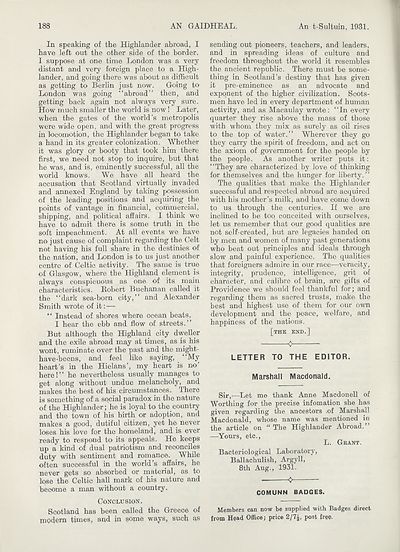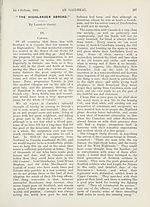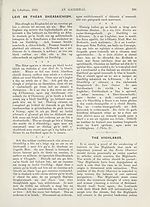An Comunn Gàidhealach Publications > Gaidheal > Volume 26, October 1930--September 1931
(244) Page 188
Download files
Complete book:
Individual page:
Thumbnail gallery: Grid view | List view

188
AN GAIDHEAL.
An t-Sultuin, 1931.
In speaking of the Highlander abroad, I
have left out the other side of the border.
I suppose at one time London was a very
distant and very foreign place to a High¬
lander, and going there was about as difficult
as getting to Berlin just now. Going to
London was going “abroad” then, and
getting back again not always very sure.
How much smaller the world is now! Later,
when the gates of the world’s metropolis
were wide open, and with the great progress
in locomotion, the Highlander began to take
a hand in its greater colonization. Whether
it was glory o.r booty that took him there
first, we need not stop to inquire, but that
he was, and is, eminently successful, all the
world knows. We have all heard the
accusation that Scotland virtually invaded
and annexed England by taking possession
of the leading positions and acquiring the
points of vantage in financial, commercial,
shipping, and political affairs. I think we
have to admit there is some truth in the
soft impeachment. At all events we have
no just cause of complaint regarding the Celt
not having his full share in the destinies of
the nation, and London is to us just another
centre of Celtic activity. The same is true
of Glasgow, where the Highland element is
always conspicuous as one of its main
characteristics. Robert Buchanan called it
the “dark sea-born city,” and Alexander
Smith wrote of it: —
“ Instead of shores where ocean beats,
I hear the ebb and flow of streets.”
But although the Highland city dweller
and the exile abroad may at times, as is his
wont, ruminate over the past and the might-
have-beens, and feel like saying, “My
heart’s in the Hielans’, my heart is no’
here!” he nevertheless usually manages to
get along without undue melancholy, and
makes the best of his circumstances. There
is something of a social paradox in the nature
of the Highlander; he is loyal to the country
and the town of his birth or adoption, and
makes a good, dutiful citizen, yet he never
loses his love for the homeland, and is ever
ready to respond to its appeals. He keeps
up a kind of dual patriotism and reconciles
duty with sentiment and romance. While
often successful in the world’s affairs, he
never gets so absorbed or material, as to
lose the Celtic hall mark of his nature and
become a man without a country.
Conclusion.
Scotland has been called the Greece of
modem times, and in some ways, such as
sending out pioneers, teachers, and leaders,
and in spreading ideas of culture and
freedom throughout the world it resembles
the ancient republic. There must be some¬
thing in Scotland’s destiny that has given
it pre-eminence as an advocate and
exponent of the higher civilization. Scots¬
men have led in every department of human
activity, and as Macaulay wrote: “In every
quarter they rise above the mass of those
with whom they mix as surely as oil rises
to the top of water.” Wherever they go
they carry the spirit of freedom, and act on
the axiom of government for the people by
the people. As another writer puts it:
“They are characterized by love of thinking
for themselves and the hunger for liberty.”
The qualities that make the Highlander
successful and respected abroad are acquired
with his mother’s milk, and have come down
to us through the centuries. If we are
inclined to be too conceited with ourselves,
let us remember that our good qualities are
not self-created, but are legacies handed on
by men and women of many past generations
who beat out principles and ideals through
slow and painful experience. The qualities
that foreigners admire in our race—veracity,
integrity, prudence, intelligence, grit of
character, and calibre of brain, are gifts of
Providence we should feel thankful for; and
regarding them as sacred trusts, make the
best and highest use of them for our own
development and the peace, welfare, and
happiness of the nations.
[the end.]
LETTER TO THE EDITOR.
Marshall Macdonald.
Sir,—Let me thank Anne Macdonell of
Worthing for the precise infomation she has
given regarding the ancestors of Marshall
Macdonald, whose name was mentioned in
the article on “ The Highlander Abroad.”
—Yours, etc.,
L. Grant.
Bacteriological Laboratory,
Ballachulish, Argyll,
8th Aug., 1931.
0
COMUNN BADGES.
Members can now be supplied with Badges direct
from Head Office; price 2/7£, post free.
AN GAIDHEAL.
An t-Sultuin, 1931.
In speaking of the Highlander abroad, I
have left out the other side of the border.
I suppose at one time London was a very
distant and very foreign place to a High¬
lander, and going there was about as difficult
as getting to Berlin just now. Going to
London was going “abroad” then, and
getting back again not always very sure.
How much smaller the world is now! Later,
when the gates of the world’s metropolis
were wide open, and with the great progress
in locomotion, the Highlander began to take
a hand in its greater colonization. Whether
it was glory o.r booty that took him there
first, we need not stop to inquire, but that
he was, and is, eminently successful, all the
world knows. We have all heard the
accusation that Scotland virtually invaded
and annexed England by taking possession
of the leading positions and acquiring the
points of vantage in financial, commercial,
shipping, and political affairs. I think we
have to admit there is some truth in the
soft impeachment. At all events we have
no just cause of complaint regarding the Celt
not having his full share in the destinies of
the nation, and London is to us just another
centre of Celtic activity. The same is true
of Glasgow, where the Highland element is
always conspicuous as one of its main
characteristics. Robert Buchanan called it
the “dark sea-born city,” and Alexander
Smith wrote of it: —
“ Instead of shores where ocean beats,
I hear the ebb and flow of streets.”
But although the Highland city dweller
and the exile abroad may at times, as is his
wont, ruminate over the past and the might-
have-beens, and feel like saying, “My
heart’s in the Hielans’, my heart is no’
here!” he nevertheless usually manages to
get along without undue melancholy, and
makes the best of his circumstances. There
is something of a social paradox in the nature
of the Highlander; he is loyal to the country
and the town of his birth or adoption, and
makes a good, dutiful citizen, yet he never
loses his love for the homeland, and is ever
ready to respond to its appeals. He keeps
up a kind of dual patriotism and reconciles
duty with sentiment and romance. While
often successful in the world’s affairs, he
never gets so absorbed or material, as to
lose the Celtic hall mark of his nature and
become a man without a country.
Conclusion.
Scotland has been called the Greece of
modem times, and in some ways, such as
sending out pioneers, teachers, and leaders,
and in spreading ideas of culture and
freedom throughout the world it resembles
the ancient republic. There must be some¬
thing in Scotland’s destiny that has given
it pre-eminence as an advocate and
exponent of the higher civilization. Scots¬
men have led in every department of human
activity, and as Macaulay wrote: “In every
quarter they rise above the mass of those
with whom they mix as surely as oil rises
to the top of water.” Wherever they go
they carry the spirit of freedom, and act on
the axiom of government for the people by
the people. As another writer puts it:
“They are characterized by love of thinking
for themselves and the hunger for liberty.”
The qualities that make the Highlander
successful and respected abroad are acquired
with his mother’s milk, and have come down
to us through the centuries. If we are
inclined to be too conceited with ourselves,
let us remember that our good qualities are
not self-created, but are legacies handed on
by men and women of many past generations
who beat out principles and ideals through
slow and painful experience. The qualities
that foreigners admire in our race—veracity,
integrity, prudence, intelligence, grit of
character, and calibre of brain, are gifts of
Providence we should feel thankful for; and
regarding them as sacred trusts, make the
best and highest use of them for our own
development and the peace, welfare, and
happiness of the nations.
[the end.]
LETTER TO THE EDITOR.
Marshall Macdonald.
Sir,—Let me thank Anne Macdonell of
Worthing for the precise infomation she has
given regarding the ancestors of Marshall
Macdonald, whose name was mentioned in
the article on “ The Highlander Abroad.”
—Yours, etc.,
L. Grant.
Bacteriological Laboratory,
Ballachulish, Argyll,
8th Aug., 1931.
0
COMUNN BADGES.
Members can now be supplied with Badges direct
from Head Office; price 2/7£, post free.
Set display mode to:
![]() Universal Viewer |
Universal Viewer | ![]() Mirador |
Large image | Transcription
Mirador |
Large image | Transcription
| An Comunn Gàidhealach > An Comunn Gàidhealach Publications > Gaidheal > Volume 26, October 1930--September 1931 > (244) Page 188 |
|---|
| Permanent URL | https://digital.nls.uk/125155332 |
|---|
| Description | This contains items published by An Comunn, which are not specifically Mòd-related. It includes journals, annual reports and corporate documents, policy statements, educational resources and published plays and literature. It is arranged alphabetically by title. |
|---|
| Description | A collection of over 400 items published by An Comunn Gàidhealach, the organisation which promotes Gaelic language and culture and organises the Royal National Mòd. Dating from 1891 up to the present day, the collection includes journals and newspapers, annual reports, educational materials, national Mòd programmes, published Mòd literature and music. |
|---|---|
| Additional NLS resources: |
|

